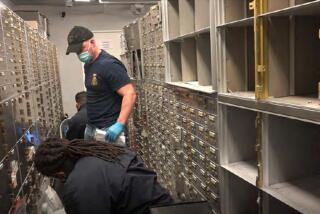U.S. Justices Uphold Right to Quick Trial : Suspect’s Arrest Came 4 1/2 Years After Charge of Embezzling $955
WASHINGTON — The Supreme Court today let stand a ruling that a criminal suspect’s right to a speedy trial must be presumed violated if law enforcement officials take too long to arrest him.
The court, without comment, refused to hear an appeal by California authorities in the case of a former gasoline station attendant arrested on embezzling charges nearly 4 1/2 years after the alleged crime.
Los Angeles police charged that Joaquin Serna took $955 in cash and disappeared after working his Sept. 8, 1978, night shift at a service station.
A misdemeanor complaint against Serna was filed three weeks later and a warrant was issued for his arrest.
But police believe he fled to Florida, and he was not arrested until Feb. 16, 1983.
Serna said he had left a forwarding address and did not try to conceal his whereabouts when he left Los Angeles in December, 1978.
He said his arrest in 1983 and the plans to prosecute him violated his constitutional right to a speedy trial.
The California Supreme Court ruled last November that “the delay was presumptively prejudicial,” and noted that there is a one-year statute of limitations in California for misdemeanors.
Had the police failed to file a complaint in 1978 against Serna, his prosecution would have been barred after one year elapsed, the state court said.
State Law Satisfied
“Although there may be cases in which a defendant is able to demonstrate actual prejudice from delays of shorter duration, he need not do so when the delay exceeds the period of limitation established by the (state) Legislature,” the state court said.
It ordered law enforcement officials to justify the delay in arresting Serna or drop the charges, and ordered further lower court hearings on whether such justification exists.
Los Angeles City Atty. James K. Hahn, in the appeal acted on today, said Serna’s speedy trial rights were not violated because the suspect said he did not even know he was wanted by police until he was arrested.
In another California case, the court agreed to decide whether states may require companies with federally approved mining operations on federal lands to obtain state permits as well.
The justices said they will hear arguments by California authorities that a limestone-mining operation in Los Padres National Forest, in the Big Sur area, should be required to obtain a state permit.
--Refused to kill a lawsuit by actress Robyn Douglass against Hustler magazine, which in 1981 published nude photographs of her.
The justices, without comment, let stand a ruling ordering a new trial against Hustler in a suit by Douglass, who starred as a college student in the movie “Breaking Away.” Lawyers for Hustler contended that the lawsuit violates the magazine’s free-press rights.
More to Read
Sign up for Essential California
The most important California stories and recommendations in your inbox every morning.
You may occasionally receive promotional content from the Los Angeles Times.









